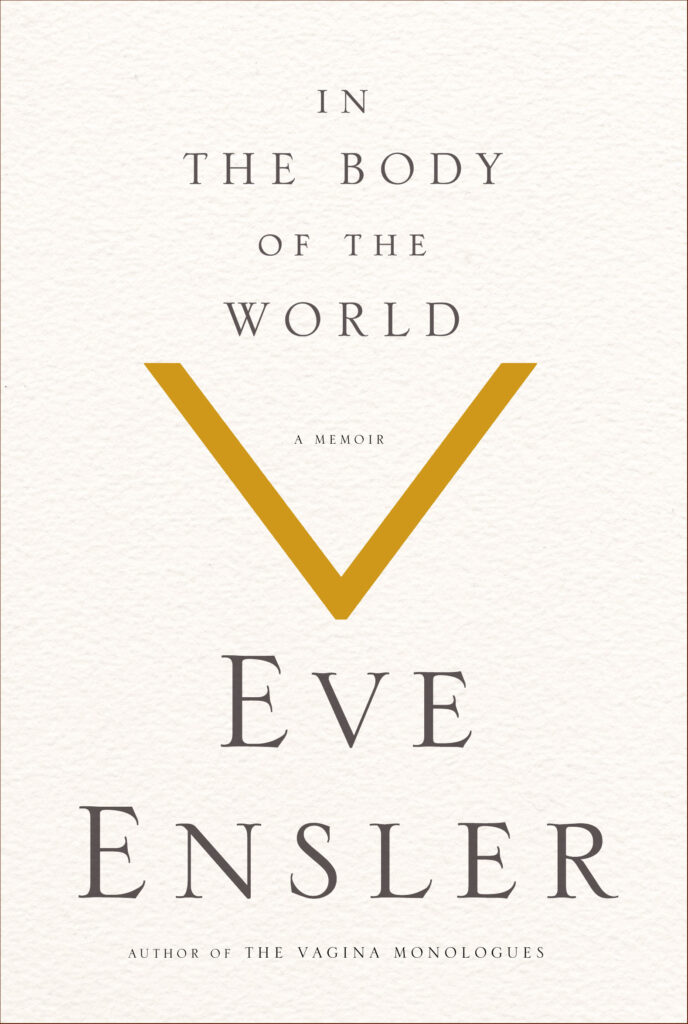What's New
Robert Shetterly Reviews In the Body of the World: A Memoir by Eve Ensler
Eve Ensler, In the Body of the World: A Memoir, Metropolitan Books, New York, 2013.

There’s a story I like to tell about William Sloane Coffin speaking at the funeral of a ten year old boy in 1984. The boy had drowned on a class trip. My daughter was in his class. The funeral was held in an old, white clapboard church in a rural part of Maine near where I live. Winter was just letting go, patches of old snow here and there, the tips of daffodil sprouts beginning to peek into the still frosty air. Reverend Coffin had also lost a son by drowning. He knew the grief and confusion of the family, the classmates, and the community. I remember only one thing about what he said that day. He looked at all of us with a kind of stern compassion and said, “Improve the quality of your suffering.”
What does that mean, improve the quality of your suffering? Isn’t suffering a hard thing the quality of which is always negative and lonely? Yes, Coffin would have said, grief and suffering are hard, they are isolating and oppressive, but everyone suffers, and if you take that pain and reach out with it to empathize with another’s suffering, you can not only help that other person, but begin to alleviate your own. You can improve its quality. He knew. He had spent a lifetime using his suffering to stand with victims of racism, poverty and war. His words struck me like a thunderbolt, a flash of clarity about how to live a better life.
This week I finished Eve Ensler‘s new memoir, In the Body of the World. If ever there was a person who has used her suffering to improve the quality of her life and the lives of countless others, it’s Eve Ensler. She weaves the various strands of her life into a rope strong enough to pull her out of her own alienation and despair and then use it as a metaphoric lifeline to pull thousands of other suffering woman to safety.
Writing in a style that is terse, funny, and shockingly — you might say shamelessly — honest she tells of the physical abuse by her father and the neglect by her mother (“I grew up not in a home but in a kind of free fall of anger and violence…”), her desperate forays into drugs and promiscuity, her simultaneous collecting of stories from all over the world of women who have suffered abuse, and then her stage IV uterine cancer. Having taken on the overwhelming burden of her own pain and the pain that of others, she is not surprised that cancer attacks her uterus where, she feels, she has harbored all this pain.
Shortly before her diagnosis, Eve had begun working in the Congo where the systematic, horrifying rape and abuse of women and girls (and men) is being used as a tactic in their civil wars to rid large areas of people so that the rare earth and metals in the land could be mined and sold to multi-national corporations for use in our computers and cell phones. The women who survive flee with their families to avoid this terror. Eve has been instrumental in envisioning and constructing the City of Joy, a haven for Congolese women where they can heal, find community, regain joy in living, and be empowered by learning trades and professions to care for themselves. For the seven months that she was hospitalized with multiple operations, pain drugs, chemotherapy, massive infections, often close to death, she talked nearly every day by phone with women in the Congo who were carrying on the work of building the City of Joy. About the women she was working with she says, “Inside these stories of unspeakable violence, inside the women of the Congo, was a determination and a life force I had never witnessed.” She was trying to help them while, at the same time, their life force was giving her the will to live. Improve the quality of your suffering.
The pace of the book is intense. After a harrowing 18 months, Eve is cancer free and back in the Congo for the dedication of the City of Joy. Beyond telling
her story she uses her experience and the experience of the women in the Congo as a metaphor of all of us. The final pages are a passionate exhortation to get involved in any of the world’s important issues. She makes a plea for us to stop pretending that the status quo which relies on the rape of women and environments for its gadgets and gizmos is sustainable. She pleads for us to stop pretending that the capsized ship of state can be righted, that what we like to think of as normal is anything but a brutal dead end. She says, “There is no more winning and losing. We have already lost. Even the so-called winners feel that way. That is why they can’t stop self-destructing. Step off the wheel of winning and losing. Of course there is risk. Of course it is dangerous. I wish I could make this easy for you. Lose everything. That is where it begins … Let us turn our pain to power, our victimhood to fire, our self-hatred to action, our self-obsession to service…”
The rapacious values that have brought our economies and our environment to the brink of collapse are not the values that will save us. Eve Ensler says, “The only salvation is kindness. The only way out is care.” In the Body of the World is a very important book, a prophetic book, written by a woman who has journeyed into hell and come back to tell us all.